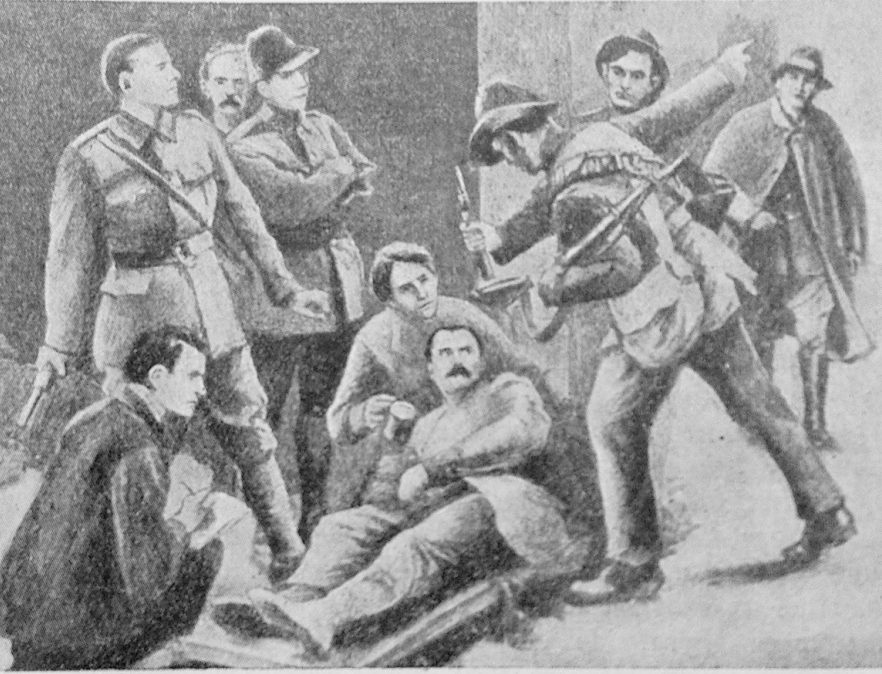
|
April 23, 2016 - No. 17 A Pro-Social Alternative to Empire-Building
Ontario
Commission
on
Public
Service On the Eve of May Day 2016 A Pro-Social Alternative to Empire-Building
The narrow private interests of the owners of social wealth are centred on empire-building within the U.S.-led imperialist system of states. The social wealth and companies they control mobilize the productive power of the working class and collective public resources of the country and state to defend and strengthen their private empires and block the people from affirming their rights and participating in nation-building. The owners of social wealth have abandoned their ideology of free enterprise capitalism of the early period in the transition from petty production to industrial mass production. Today, the state and the public and private institutions under the domination of owners of social wealth have become the main weapons for empire-building and to strengthen and expand their private interests. Owners of social wealth now openly repudiate the ideology of free competitive enterprise and espouse the ideology of making their private empires competitive and dominant through the direct institutional, financial and arbitrary powers of the state within the imperialist system of states. The objectives they pursue in their every decision and action are centred on mobilizing the collective social wealth and the power of the state for empire-building in the service of their private interests. Sending the Canadian military abroad to suppress nation-building projects of others and force them into the U.S.-led imperialist system of states is touted as our "responsibility to protect" or the retrogressive liberal ideology of "responsible conviction." State-organized pay-the-rich public grants, subsidies and tax rebates for private companies are officially lauded as "Business Support Programs." The building of state-funded and guaranteed social and material infrastructure by private engineering and construction monopolies for use in empire-building is acclaimed as job creation projects to strengthen the export-driven economy. The ideology of the nascent European capitalist nation-builders of the 19th century was given rise to in opposition to the autocratic medieval forces of petty production. This is the ideology which was brought to what they called "the new world." It has now been abandoned out of necessity in the face of blatant state-organized mobilization of the country's human and natural resources for empire-building to serve particular private interests. The empire-builders have organized think-tanks, panels, universities and governments to concoct an ideology and policy objectives that serve the narrow private interests of those who control social wealth and the state. The working class cannot and should not become embroiled in the sectarian squabbles of the cartel political parties over policy objectives rooted in the ideological considerations of the ruling elite. Only by being consistent in its modern ideological considerations and taking independent political stands on this basis can the working class organize and activate its practical politics and nation-building agenda. The modern ideology drives the political movement to stop paying the rich, increase investments in social programs and defend security by upholding the rights of all. Ontario Commission on Public Service The Working Class Must Confront
|
|
On April 28, across the country workers will observe the National Day of Mourning for Workers Killed and Injured on the Job. The slogan adopted by the workers' movement is Mourn for the Dead, Fight for the Living. It is very apt. Every day brings evidence of the negligence on the part of the monopolies that leads to injuries and deaths at work because they consider health and safety "a cost" which interferes with their ability to maximize profits. So too governments are removing regulations that enforce health and safety at work. Every day brings evidence of the fact that industry self-regulation creates havoc affecting not only production and the workforce but society at large. These incidents reinforce the demand that industry self-regulation must be banned.
Industry self-regulation is a major feature of the neo-liberal anti-social offensive of the rich and their governments. Self-regulation is integral to the smashing of public authority in favour of decision-making by private interests. It eliminates public standards enforced by a public authority. It makes working conditions, the health and safety of workers and communities and other aspects of the operations of industries the private domain of private interests. Self-regulation makes private interests that control forces of production unaccountable for activities that are harmful to the very lives of the workers and society.
How modern industries should run and their requirements of production are well known to those involved. The public standards and regulations enforcing these requirements are an expression of how far society has developed. Industry self-regulation driven by narrow private interests and their aims and whims disrupts the productive work of human beings and their efforts to take control of the forces of production and humanize society.
Recently on April 10, two workers washing windows five storeys up on a university building in downtown Montreal were involved in a tragic event where one died and the other was severely injured. The injured worker remained in a critical state for a number of days but luckily his condition has improved to stable.
The two workers fell more than 50 feet when the crane holding the cage in which they were working overturned because the truck on which it was mounted suddenly tilted. Other workers washing windows on the site were in a state of shock and had to be taken to the hospital as well. The man who died was the father of the worker who was injured.
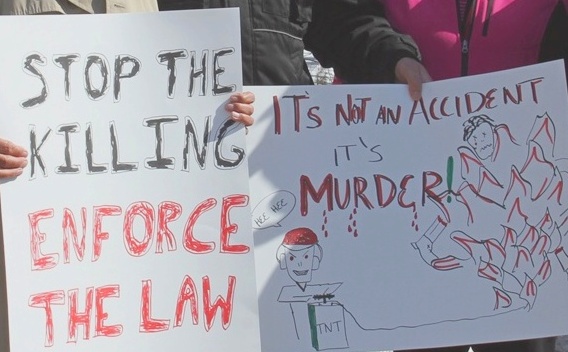 An investigation has since
revealed that the crane operator did not secure the truck properly on
solid ground and as a result the truck leaned over under the weight of
the crane. Also known now is that the crane operator had no formal
training in the standard operation of a crane. In Quebec, the training
of crane operators working on non-construction sites is not mandatory.
Non-construction crane operation is officially considered less
hazardous and it is left to private interests to decide the
qualifications of the operators.
An investigation has since
revealed that the crane operator did not secure the truck properly on
solid ground and as a result the truck leaned over under the weight of
the crane. Also known now is that the crane operator had no formal
training in the standard operation of a crane. In Quebec, the training
of crane operators working on non-construction sites is not mandatory.
Non-construction crane operation is officially considered less
hazardous and it is left to private interests to decide the
qualifications of the operators.
As if the self-regulation of non-construction sites is not already criminal enough, a health and safety representative in the construction sector informed TML that the Quebec Construction Commission (CCQ), the regulatory agency of the Quebec government overseeing the construction industry, is now lobbying to reduce the formal training of crane operators on construction sites.
Presently, crane operators in construction must take a 780-hour course administered by the CCQ and given by construction crane operators. The CCQ wants that course to be reduced to 180 hours and to be given by the industry itself.
Construction is well-known as the deadliest industry in Quebec in terms of casualties at the worksite yet the government agency is proposing self-regulation. All evidence shows that increased public enforcement of standards and regulations is required not the opposite. Self-regulation makes no sense and workers who do the work are fully aware of the need for public enforcement.
The CCQ's lobbying to reduce training for crane operators is a dictate coming from the construction companies. They claim formal training is a cost that must be reduced and not something integral to the modern production process. The government, through its CCQ regulatory agency, is shamefully making itself the instrument of this dictate of private interests. The government is negating itself as a public authority that must protect workers. This is unacceptable and defies logic, but that is the state of affairs under the neo-liberal nation-wrecking agenda, which the organized force of the working class must defeat.
As shocking as the consequences of self-regulation is the pragmatism of those with power and privilege who push these plans. In the case of the construction industry, no other argument is given than that the current formal training of crane operators is too costly for the companies. They partly finance the training programs and this they profess is a hindrance to their profits and competitiveness. Profits and competitiveness are made the aim of the running of industries and whatever serves that aim is considered justified whatever the consequences for workers and society.
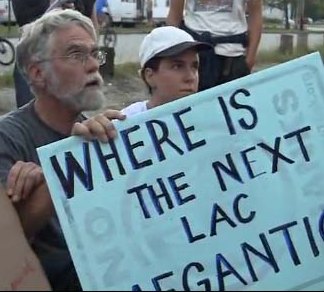 Pragmatism is also the name
of the game in terms of the
self-regulation of railways. In 1999, the Chrétien government
introduced self-regulation with respect to rail safety and safety
programs through what is called the Railway Safety Management
System Regulations. This system entrusts the railways to work out
their own safety programs, which the government then audits and
rubber stamps. The logic behind railway self-regulation is again
that safety is a cost to the railways, which must be considered
along with all the other costs the companies have to bear in
production. The working class rejects this capital-centred
thinking and posits that the enforcement of public standards and
raising the level of the working class through training and
education add value to production, humanize society, and defend
the people's right to be.
Pragmatism is also the name
of the game in terms of the
self-regulation of railways. In 1999, the Chrétien government
introduced self-regulation with respect to rail safety and safety
programs through what is called the Railway Safety Management
System Regulations. This system entrusts the railways to work out
their own safety programs, which the government then audits and
rubber stamps. The logic behind railway self-regulation is again
that safety is a cost to the railways, which must be considered
along with all the other costs the companies have to bear in
production. The working class rejects this capital-centred
thinking and posits that the enforcement of public standards and
raising the level of the working class through training and
education add value to production, humanize society, and defend
the people's right to be.
The Chrétien deregulation put safety programs and enforcement in the private domain of railways and even shrouded them in secrecy to the point that railway workers and unions are not even allowed to read the regulations. To suggest those in control of the private railways know better than a public authority and the workers themselves what must be done to run their operations safely is a cruel joke. Tragedies such as the explosion and fire at Lac-Mégantic, which killed 47 people and injured many more, are dismissed and not considered evidence enough for governments to conclude that railway self-regulation is dangerous for workers and communities and must be banned.
Industry self-regulation goes against the trend of human beings taking control of their lives. The organized working class movement has the social responsibility to deprive the neo-liberals in power from blocking the progressive trend of history. Workers must accept nothing less than the establishment of public authorities in all sectors of the economy dedicated to enforce the highest level of standards in the public interest.
Self-regulation of industries is in contempt of industrial mass production and modern society. The organized working class movement will not rest until all sectors of the economy are brought under the most advanced standards enforced with a public authority that gains the confidence of the people through its decisive actions in defence of the public interest.
Nation-Building in the 21st Century or Empire-Building
Finding a Practical Way Forward for
the Workers' Movement to
Make the Struggle
for Rights Effective at This Time
Hamilton, May 1, 2014
On the eve of May Day 2016, TML Weekly is publishing the presentation made by Rolf Gerstenberger at the Conference on Rights April 10 in Montreal organized by the Marxist-Leninist Party of Quebec. Rolf is President of the Marxist-Leninist Party of Canada and former President of Local 1005 USW.
***
Nation-building in the 21st century has to overcome the obstacles that developed during the 20th century. These obstacles derive primarily from the empire-building of the global monopolies and the big powers with which they are connected. Empire-building of the global monopolies during the twentieth century overwhelmed and defeated the nation-builders of the nineteenth century, the nascent period of capitalism, and the heroic nation-building attempt of the working class in the Soviet Union.
The empire-builders have established monopoly right as the dominant right worldwide overpowering public right. Through free trade under the domination of the monopolies and their global financial agencies including the World Bank and International Monetary Fund, the monopolies have trampled on the reality and politics of self-reliant economies serving the well-being of the people and acting as the material guarantor of their rights.
 Brandishing the medieval dictum of
might makes right, especially
the might of the U.S. military and those of the other big powers
through military alliances such as NATO, NORAD and the U.S./Japan
military alliance, monopoly right
imposes upon the entire world the narrow private interests of
those who control great social wealth crushing public right and
the governments of laws that nation-builders have attempted to
create.
Brandishing the medieval dictum of
might makes right, especially
the might of the U.S. military and those of the other big powers
through military alliances such as NATO, NORAD and the U.S./Japan
military alliance, monopoly right
imposes upon the entire world the narrow private interests of
those who control great social wealth crushing public right and
the governments of laws that nation-builders have attempted to
create.
The world has entered a period of lawlessness where the empire-builders and their monopoly right, free trade and military might makes right are blocking the people from solving problems in the public interest, and stifling all efforts towards nation-building. Everything from the earlier period, the victories and institutions of the great anti-fascist war and dismantling of colonialism has become profane and subject to the demand to serve the narrow private interests of the empire-builders, especially their insatiable thirst to reap maximum private profit from the value the working people produce.
I worked my entire adult employed life producing steel at Stelco's Hamilton Steel Works. The U.S. empire-builders who arrived in 2007 were contemptuous of our mill, did not regard it as a precious asset in building Canada, which should have been constantly renewed and modernized. They eventually destroyed its main productive capacity because it did not fit into their secret global plans, if they even had a plan other than to eliminate it as a competitor of their U.S. mills and strip it of its assets. The steel mill and its companion works, which at one time stretched throughout Canada including right here in Quebec, became pawns of the striving of private interests to amass fortunes, not through building anything but rather through intrigue, wrecking and state-organized pay-the-rich schemes.
Through their neo-liberal political representatives, the empire-builders have concocted instruments to subvert the government of laws and long-held arrangements such as collective agreements with the organized working class. Public revenue is being pillaged through privatizations, P3s [public-private partnerships] and other pay-the-rich schemes. The rich constantly devise methods mainly based on parasitism to "move money around" or entice the gullible to invest in reckless schemes such as bonds of amassed subprime mortgages, schemes that are all directed at claiming for the rich an ever greater portion of the value the working class produces.
One institution those who
control the monopolies have
concocted to fleece the working class and others is a kind of
kangaroo court, a Wild West show where anything goes that serves
their narrow private interests. They call it the Companies'
Creditors Arrangement Act (CCAA) which has now become so
infamous.
Stelco steel works is now in its second misadventure in CCAA and our comrades in Algoma Steel are in their third go-around. The CCAA is all about wrecking and pillaging. No problems are resolved. Nothing is built. Working lives are ruined. Retirees suffer. Many youth never get a chance to step into industrial production because it is dismantled and outsourced. With CCAA, the empire-builders seek to negate all previous arrangements with the working class such as their collective agreements or the laws governing their pensions. In some cases, the productive entity itself and its sales are fine but the empire-builders have gone off the cliff elsewhere in the world -- which appears to be the case with Essar in Sault Ste. Marie, where the global company headquartered in one of those tax havens exposed in the Panama Papers is deeply in debt and is facing many problems outside Canada.
A common thread with CCAA is the refusal of the empire-builders to face up to the contradictions of the transitional capitalist system as they present themselves, and the reality that problems must be resolved if the economic unit and economy are to move forward. Proponents of neo-liberalism are advocating free trade as the only way to sort out the problems at Stelco and Essar. They even suggest a steel sector is not needed in Canada and steel should simply be bought from wherever within the global economy. Some so-called experts are quoted as saying that our mills should be sold off as so much scrap. Essar Algoma is located in Sault Ste. Marie, a northern Ontario city of 80,000 people where 70 per cent of the population depend on the Algoma steel works in one way or another. Those experts who call for its liquidation and other free trade disasters should be publicly denounced as criminals.
 The wrecking of heavy
industry is not only a great crime
against active workers, retirees and their communities but also
an enormous step backwards because it deprives our youth of a
chance to participate in industrial production. Such is the crime
of Air Canada and the Aveos scandal to attack our most important
asset of the modern world, the industrial working class. Now the
Trudeau Liberal government is rewriting history and changing
retroactively the law from 1988 that said a privatized Air Canada
would have "to maintain operational and overhaul centres in the
City of Winnipeg, the Montreal Urban Community and the City of
Mississauga." Trudeau's Transport Minister Marc Garneau has
tabled a bill to legalize Air Canada's decades-long flaunting of
that law. The mealy-mouthed empire-builder Garneau excused the
crime with the typical neo-liberal jargon saying, "We're
recognizing that in today's competitive world, Air Canada --
which competes not only in Canada but also internationally -- should
not have certain restrictions imposed upon it
which make it more difficult for it to be competitive."
The wrecking of heavy
industry is not only a great crime
against active workers, retirees and their communities but also
an enormous step backwards because it deprives our youth of a
chance to participate in industrial production. Such is the crime
of Air Canada and the Aveos scandal to attack our most important
asset of the modern world, the industrial working class. Now the
Trudeau Liberal government is rewriting history and changing
retroactively the law from 1988 that said a privatized Air Canada
would have "to maintain operational and overhaul centres in the
City of Winnipeg, the Montreal Urban Community and the City of
Mississauga." Trudeau's Transport Minister Marc Garneau has
tabled a bill to legalize Air Canada's decades-long flaunting of
that law. The mealy-mouthed empire-builder Garneau excused the
crime with the typical neo-liberal jargon saying, "We're
recognizing that in today's competitive world, Air Canada --
which competes not only in Canada but also internationally -- should
not have certain restrictions imposed upon it
which make it more difficult for it to be competitive."
Everything is excused for the greater good of the monopolies in opposition to the greater good and rights of the workers and the national economy. The Trudeau Liberals want no restrictions put on the empire-building of a privatized Air Canada so it can compete internationally to enrich its main owners and executives while industrial workers lose their jobs and three local economies are weakened.
Any principle can be trampled in the mud with this pathetic imperialist pragmatism to give monopolies free rein and "not have restrictions imposed on them." The human factor and objective conditions of production are viewed as mere pawns to pay the rich. The working class has the opposite viewpoint: for the sake of nation-building and the public good, the monopolies must have restrictions placed on their monopoly right and operations; otherwise they are out-of-control train wrecks such as tragically witnessed in Lac-Mégantic.
No nation can call itself modern and human-centred without public health care and education as a right for all without exception but also no nation can be built and establish the material basis to guarantee the rights of all without a vigorous and large industrial working class and its objective conditions of production. To attack industry, to wreck industry and have the empire-builders ship it out of the country to who knows where is to attack the industrial working class and any chance of modern nation-building.
Vivid examples testify to the attacks on nation-building and the working class, such as the terrible tragedy unfolding in the energy sector where workers and entire communities are reeling in pain. The callous response of the Prime Minister to this pain should be roundly denounced. His words that to be fired from the energy sector in Edmonton is better than to be fired in Calgary, and the unemployed in Edmonton should not receive the same number of weeks of employment insurance can only come from someone who was brought up and lives within a protected world of class privilege. He certainly does not share weal and woe with the working people. He does not have the same conditions of life as the workers in the energy sector or Indigenous peoples on the reserves or in urban settings. A CCAA judge is also not our peer. His retirement conditions are not the same as ours. He should not be ruling on our pensions. So too the Ministers who are cutting social programs are not facing the consequences of their actions. They may have private means to look after themselves and educate their children. We do not.
The conclusion is that we can expect nothing from this ruling elite which has changed the aim of the society from serving a public good to making the monopolies number one on world markets.
The organized working class
has to turn the situation around
in favour of the people and their empowerment, in favour of
public right and public interest. Through organized actions with
analysis the working class can present an agenda and new
direction to stop the suffering, to put an end to the vicious
cycle of booms and busts and recurring crises. This is what we
have done at Stelco. Our slogans to Keep
Stelco
Producing,
Keep
Hamilton
Producing,
Keep
Canada
Producing represent the
expectations of the people of this country. Ours is the voice of
the working class at a time organized labour is not championing
these views, they are succumbing to the views of those who want
one section of the monopolies to prevail over another in the
inter-monopoly competition for domination over the different
sectors of the economy. They still believe that negotiations are
possible despite the dictate of the monopolies and their refusal
to negotiate and they are not forming a block to deprive those
who are depriving us of what belongs to us by right. This too is
a serious problem we have to deal with.
In building anything, the people are faced with obstacles. Those obstacles are found in nature and in society, especially in the relations that bind us to a certain way of doing things. At this point the biggest obstacle we face as nation-builders is found in the entanglement of social relations the empire-builders have wrapped around the objective and subjective conditions of production. The subjective conditions are held in place primarily through ideological entanglements that cloud our minds and make us feel helpless and incapable of changing and building anything.
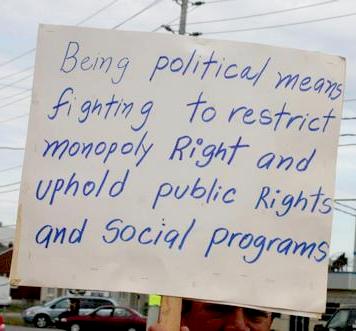 To turn the objective
conditions of production into
instruments that serve nation-building we need to confront the
subjective conditions over which we can definitely do something.
The subjective conditions are the way we think about ourselves
and our predicament, how we relate to one another and to our
objective conditions of production and what organizational and
other measures we must take to remove the cloud and obstacles
obscuring and blocking the way forward.
To turn the objective
conditions of production into
instruments that serve nation-building we need to confront the
subjective conditions over which we can definitely do something.
The subjective conditions are the way we think about ourselves
and our predicament, how we relate to one another and to our
objective conditions of production and what organizational and
other measures we must take to remove the cloud and obstacles
obscuring and blocking the way forward.
The working class everywhere is faced with the necessity of confronting the empire-builders with its own agenda for nation-building in the present. We know what we do not like but we are not so sure about how to make the step forward towards what we do like. The first step is to deprive the empire-builders of their hold over our thinking and organizations, to deprive them of imposing their political, economic, social and theoretical agenda on us. We have to cast off their capital-centred agenda and fashion our own human-centred agenda with our own powerful organizations.
From my working life in the steel mill and fighting to protect the interests of myself and my fellow steelworkers, I learned firsthand that without organization and without combating the ideological pressure the resistance cannot be sustained. Without internal organizing and ideologizing there can be no external strength and practical politics amongst the broad masses of the people; and conversely, without using the internal organizing and ideologizing to advance and broaden the external strength and practical politics amongst the people, the internal organizing withers, becomes dogmatic and eventually collapses.
We learned this at Stelco with the help of the
Communist
Party of Canada (Marxist-Leninist) and its leadership. Without
the internal strength of organizing and thinking things through
and summing them up, without taking our own thinking and agenda
out to the entire working class in the mills and city and our
allies in other strata throughout the city, province and country
we could not prevail. But even then we could not prevent the
attacks of the empire-builders because they control the social
wealth; they control the objective conditions of production; they
control the official politics and instruments of state power. We
soon realized we need the organization and numerical strength of
the entire working class and its allies from coast to coast to
coast throughout Canada and Quebec if our own organizing and
practical politics are to advance within a broad nation-building
project.
We have to consolidate this organizational internal
strength
so that we can extend it externally to the entire working class
and all those yearning for empowerment and a modern agenda for
nation-building.
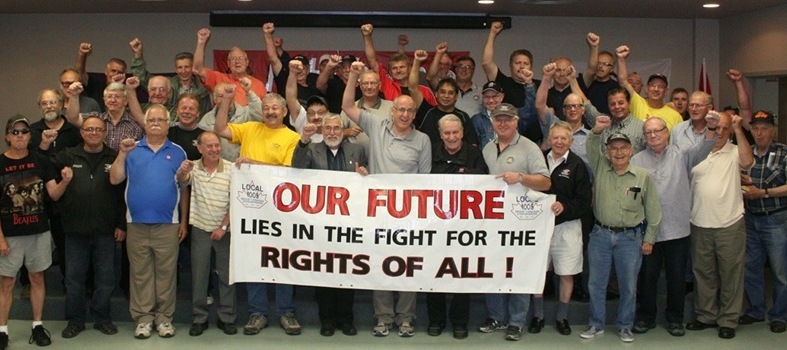
In June 2013 Local 1005 USW celebrated 10 years of Thursday meetings
where workers
develop their
independent politics.
Let me speak on some practical things we have learned about the human-centred economic agenda through our 20-year struggle at Stelco to defend our rights in the face of monopoly right.
The steel sector is dominated by empire-builders. We have U.S. Steel, Essar, ArcelorMittal and a few others. They all like to complain that Chinese steel is the main problem plaguing the steel sector in North America. How could Chinese steel be the problem in your own economy if that economy has a nation-building agenda? It would never be a problem and possibly even a blessing under a trading regime of mutual benefit in supplying certain types of steel that we have yet to learn how to produce and which we could learn from them and they could learn from us.
If the public in a nation cannot exercise control over what products come in and leave, then what kind of national economy is that? Certainly not one under the control of the actual producers and broad masses of the people, serving the public good and interests and constantly being strengthened. The global monopolies control imports and exports under free trade. If the steel monopolies were serious about building a Canadian steel sector, they would be opposed to free trade but they are not and their political champion now is Trudeau. For them, free trade is the freedom to dictate their views and private interests on us and on the Chinese and everyone else. They want to whine when some imports hurt their particular sales but they do not want a public authority that can control what comes into the country and at what prices. They are hypocrites who simply want to divert the working class from taking up its own agenda to deprive the empire-builders of imposing their anti-social anti-national agenda.
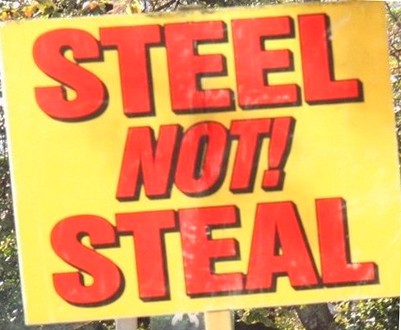 The human-centred agenda
for the steel sector is quite simple
in its initial stage. Steel is a strategic product for any
economy. Any nation, especially one as large as Canada and Quebec
must produce enough steel to meet the economy's apparent need
with an appropriate quality without disruptions.
The human-centred agenda
for the steel sector is quite simple
in its initial stage. Steel is a strategic product for any
economy. Any nation, especially one as large as Canada and Quebec
must produce enough steel to meet the economy's apparent need
with an appropriate quality without disruptions.
The empire-builders say no, no, that is bad, that will not be good for the economy. They say this with a straight face even in the face of the recurring crises and serious problems of their free trade empire-building agenda where bankruptcy protection is more common than not and brandished as a threat against the working class and where without pay-the-rich schemes from the public treasury the monopolies say they cannot compete and survive.
Why is it not good for the economy to produce what the economy needs and to build up the internal skill and expertise and objective conditions of production to meet those needs without ups and downs, wild swings and crises? You hardly have any steel production anymore in Quebec. Why is it shipped in from elsewhere at great expense and to the detriment of the Quebec working class? Because Quebec has been victimized by the empire-builders and has had its nation-building project hijacked and suppressed. All five regions of Canada should have a vigorous self-reliant steel sector -- the Maritimes, Quebec, Ontario, the Prairies and BC.
What about prices of production? The energy, steel and raw material sectors are all suffering because global market prices have fallen. Why should prices fall below their prices of production? Why do market prices fluctuate wildly up and down away from their prices of production? Because we humans are not in control. We humans pride ourselves on controlling the forces of production to produce steel from raw material to finished product. We pride ourselves on the ability to bring oil and iron ore out of the ground and refine it for our use and put airlines into the air and spaceships into space, but when it comes to pricing commodities we stare at each other dumbfounded because the empire-builders tell us some non-human magician is in charge of prices, some non-human force called the market with its invisible hand is controlling the prices and nothing can or should be done. Can you imagine this nonsense that nothing can be done? We humans can send fellow humans into space and transform heat into mechanical motion but nothing can be done to control prices. Meanwhile our lives are turned upside down because this mysterious non-human market kicks us in the gut. This monopoly dictate is anti-human nonsense that should be rejected with contempt.
In January 2004, steel
prices were low and Stelco executives said the company had a liquidity
problem because of low prices and because they wanted to rid the
company of steelworkers' defined-benefit pensions. But the
empire-builders in control had an even bigger agenda; they saw an
opportunity to make a big score using the weapon of CCAA. So they went
into CCAA bankruptcy protection, which our Local 1005 immediately
denounced as a fraud. And you know what? Within the first month in
CCAA, steel prices jumped higher and the company was having not one but
month after month of stupendous profits, some of the best on record.
But this did not stop them from continuing the CCAA fraud and
manipulating the situation in an effort to eliminate our
defined-benefit pensions and hit a big score. Well, they did hit a big
score three years later with the sale of the company to U.S. Steel but
they did not eliminate our pensions because of steelworkers' organized
resistance.
Steelworkers in Local 1005 refused to participate in the CCAA farce. We denounced it from the beginning as a fraud and produced reams of material to prove our point; we took our views out into the community and won widespread support and saved our defined-benefit pensions for the time being. But the empire-builders are persistent; they kept hammering away at us. The province gave the schemers $150 million and an extension of the payment holiday to make the pension plans whole until the end of 2015. So Stelco was fattened up so to speak for the sell-out to U.S. Steel and that monopoly with its many mills in the U.S. and Europe proved to be an even bigger enemy with more resources to attack us and attack us they did.
Ontario's $150 million was essentially the entire equity value of the company at the time Stelco exited CCAA, when its debts and obligations were considered. Instead of the province giving the money to the schemers so they could then turn around and sell the company for a big score to U.S. Steel, the province could have bought Stelco outright and made something of it instead of the wrecking mess that U.S. Steel has thrown in our faces.
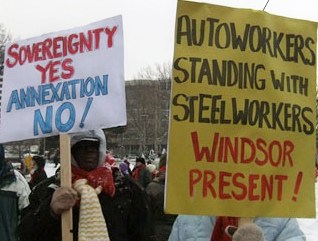 But an important point in
all this is that the province buying the mills would not have been
enough. Public buying of companies under the control of the
empire-builders is not enough to turn the economy around in a new
direction towards nation-building. More often than not at this point in
history so-called nationalization, such as the U.S. and Canadian
governments' purchase of General Motors during the economic crisis in
2008-09, is to pay the rich. That was not called a nationalization but
ownership of shares, as part of the general empire-building agenda to
pay the rich. Today both the Quebec and the federal governments are
making arrangements to fork over a lot of money to Bombardier all in
the name of saving jobs. But it too is for empire-building and to pay
the rich.
But an important point in
all this is that the province buying the mills would not have been
enough. Public buying of companies under the control of the
empire-builders is not enough to turn the economy around in a new
direction towards nation-building. More often than not at this point in
history so-called nationalization, such as the U.S. and Canadian
governments' purchase of General Motors during the economic crisis in
2008-09, is to pay the rich. That was not called a nationalization but
ownership of shares, as part of the general empire-building agenda to
pay the rich. Today both the Quebec and the federal governments are
making arrangements to fork over a lot of money to Bombardier all in
the name of saving jobs. But it too is for empire-building and to pay
the rich.
If nationalization is to amount to anything positive in the public interest, it must be part of a broad nation-building agenda where the aim of the society must be set by the workers and people themselves. As an example, in the steel sector it must include the building of public institutions with the authority to control the wholesale market and prices, with the authority to control what comes in and goes out of the country. It has to be part of a nation-building project to deprive the empire-builders of their power to pay the rich and block nation building, the power to deprive the empire builders of the power to deprive the people of their rights, interests and future. It must be a new direction for the economy.
We steelworkers know exactly what value goes into producing steel. We know the transferred-value that we transfer and preserve in the steel from the value of inputs of material, energy, machines and buildings. We know how much work-time we put into the steel to produce and reproduce value, which is the new value we create. The new value together with the old value from the inputs is the total value. It is not a big mystery. With the knowledge of the sum of the new and old value, a modern formula exists to find the price of production of all commodities with an average rate of profit, and that should become the exchange-value in the market.
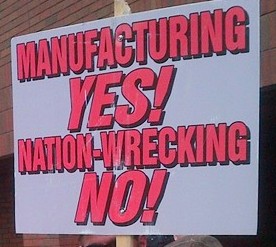 The internal market of a
self-reliant diverse Canadian and Quebec economy should be the base
from which our economy reaches out to others internationally and trades
for mutual benefit. With a public institution in control, a public
wholesale sector of basic commodities is not only possible but
necessary for the good of the economy and to free it from recurring
crises. Not just any old public institution but one where the actual
producers from each sector are actively and consciously involved to
defend their interests and those of the public, a public institution in
which the public has confidence in exercising its control and oversight
so that it remains free from corruption, monopoly right and narrow
private interests.
The internal market of a
self-reliant diverse Canadian and Quebec economy should be the base
from which our economy reaches out to others internationally and trades
for mutual benefit. With a public institution in control, a public
wholesale sector of basic commodities is not only possible but
necessary for the good of the economy and to free it from recurring
crises. Not just any old public institution but one where the actual
producers from each sector are actively and consciously involved to
defend their interests and those of the public, a public institution in
which the public has confidence in exercising its control and oversight
so that it remains free from corruption, monopoly right and narrow
private interests.
Issues of public concern exist with all economic sectors, but of particular importance is the building of social programs and public services that guarantee the rights of the people. No excuse should be tolerated for interference from the rich and their monopolies in the building of social programs and public services, the vast public social and material infrastructure that a modern nation needs and without which the economy cannot function, cannot guarantee the rights of the people. Public enterprise, social programs and public services are a great guarantor of stability in the economy and cornerstone of the people's well-being and source of revenue for the state.
The Trudeau empire-builders are saying they are going to invest in infrastructure. But two very different agendas surround the building of infrastructure: empire-building versus nation-building. The Trudeau Liberals are borrowing vast sums from the global financial oligarchy, over $100 billion in the initial stages. That is not nation-building. That is indebting the people to the international plutocrats who want nothing better than to park their social wealth in Canadian government bonds even when the interest rate is low. No better safe place exists at this point where the empire-builders can put their excess money. The interest service charges on this Trudeau debt over the years covered in budget 2016 will be greater even than the sum of deficits.
Nation-building cannot advance with the private financial plutocrats in control of the country's social wealth. The financial sector now dominated by the big private banks, insurance and lending monopolies must change and be challenged by public enterprises. All the regulations that protect the private financial enterprises, provide them with public funds and allow them to control the money supply must be renewed on a modern basis if any advance is to be made in overcoming the recurring economic crises and in nation-building.
No excuse exists for public borrowing from private interests. No excuse exists to allow private banks to control the money supply to serve their narrow private interests for empire-building. Public banks should become the norm in all regions along with a strengthened Bank of Canada in which Canadians can have confidence and over which they can exercise control. No excuse exists for the continued existence of the big private financial enterprises where Canadians put their social wealth, which the state supports through pay-the-rich schemes, and a handful of autocrats control and dictate how the country's social wealth is distributed and used.
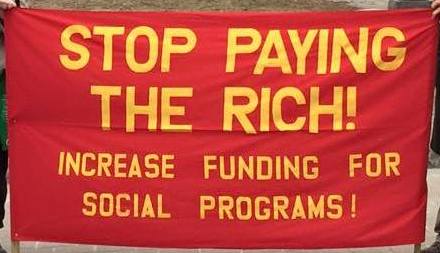 Another aspect of Trudeau's
empire-building infrastructure agenda is very simply who is in control.
The Trudeau Liberals and those in Quebec and elsewhere all hand over
control of the building of infrastructure to the big private
monopolies. They have even concocted a fanciful term called
public-private partnerships or P3s. Giant construction companies such
as Bechtel from the U.S., SNC Lavalin and others gorge themselves at
the trough of publicly funded and guaranteed infrastructure projects
including military projects such as the building of Coast Guard and
Navy ships, helicopters and fighter jets. This should change; it must
change for Quebec and Canada to advance. Social and material
infrastructure must be public from beginning to end and throughout
their productive lives; they must be public from top to bottom from
building structures to supplying those hospitals and educational
institutions with material supplies and the human factor.
Another aspect of Trudeau's
empire-building infrastructure agenda is very simply who is in control.
The Trudeau Liberals and those in Quebec and elsewhere all hand over
control of the building of infrastructure to the big private
monopolies. They have even concocted a fanciful term called
public-private partnerships or P3s. Giant construction companies such
as Bechtel from the U.S., SNC Lavalin and others gorge themselves at
the trough of publicly funded and guaranteed infrastructure projects
including military projects such as the building of Coast Guard and
Navy ships, helicopters and fighter jets. This should change; it must
change for Quebec and Canada to advance. Social and material
infrastructure must be public from beginning to end and throughout
their productive lives; they must be public from top to bottom from
building structures to supplying those hospitals and educational
institutions with material supplies and the human factor.
Another crucial aspect of infrastructure empire-building that must change is how the produced value from the social and material infrastructure is realized or rather not realized at present. Instead of an exchange of equivalent value, infrastructure value is paid for mostly from individual taxation, which is a farce as infrastructure is mostly means of production not articles of consumption.
All economic units active in the economy, both public and private, must realize or pay for the value they consume that comes from the social and material infrastructure. The value that economic units consume from public health care, education and the vast network of transportation, roads, bridges, mass transit, water, sewage, waste disposal etc. must be realized as a normal aspect of doing business. Just as we steelworkers know exactly the price of production of what we produce so too do those active in the social and material infrastructure know the price of production of what they produce or at least they would know once organized to do so. How to price the value they produce and how much the economic units in the economy consume, and should therefore realize as buyers of value are all matters of economic science and entirely knowable. For as long as the economy is based on the production of commodities for exchange and not use then the value of our social and material infrastructure, our national means of production, much be exchanged and realized similar to any means of production consumed within the economy.
This issue raises the importance of renewing the taxation system and eliminating all forms of individual taxation such as income taxes, sales taxes, property taxes and user fees for public services, and instituting state claims on the value it requires directly from the economy through public enterprise and other methods and not indirectly from workers and other individuals. Finding a new direction for the taxation system, on how the state claims the value it requires directly from the economy is an important issue the working class must take up as part of its nation-building agenda.
Finally on the economic front, it is important to have some discussion on wages and benefits that make up workers' individual reproduced-value, which has been the traditional area of main concern of trade unions. Within the nation-building agenda, individual reproduced-value is important and the working class is in a constant battle to defend and improve the individual claim on the value workers produce. But individual reproduced-value is just one portion of the new value the working class produces and reproduces, and which workers and the nation need to guarantee their and their families' well-being throughout their lives and for the economy to grow and thrive and become modern and gain the capacity to humanize the social and natural environment.
The other parts of the new value workers produce, the social reproduced-value and added-value, are essential for nation-building and should be on the radar of the working class and central within its human-centred agenda. I already mentioned the social reproduced-value, which is that part of the newly produced value that reproduces the social infrastructure, the public health care, education and other social programs necessary for any modern nation. The individual and social reproduced-value is in contradiction with the added-value because the added-value plus reproduced-value is the new value workers produce during their work-time. The added-value is the value available to expand the economy so that it can meet the growing needs of all and guarantee their rights. No nation-building project can succeed without an agenda to defend social reproduced-value and to expand control over the added-value in opposition to the claims of the empire-builders, and to enhance the social and material infrastructure and ensure it is properly realized. This should all be on our plates as nation-builders not just the defence of our individual reproduced-value.
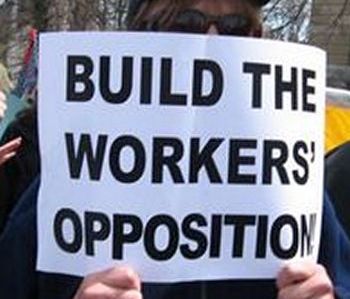 The working class as the
advanced force and actual producers
must expand its control over the entire new value it produces.
Only in that way can it guarantee that the social wealth it
produces goes towards guaranteeing the rights of the people,
their empowerment and nation-building. The working class with
organization and its own thinking and agenda can deprive the
empire-builders of their power to deprive the people and nation
of their rights.
The working class as the
advanced force and actual producers
must expand its control over the entire new value it produces.
Only in that way can it guarantee that the social wealth it
produces goes towards guaranteeing the rights of the people,
their empowerment and nation-building. The working class with
organization and its own thinking and agenda can deprive the
empire-builders of their power to deprive the people and nation
of their rights.
The first task is to challenge the ideological underpinnings of their sell-out and warmongering agenda. It is to say NO! to their schemes, as the workers and people are already doing so that they cannot say they have our consent. It is to make that voice heard countrywide.
This great organizational task may look forbidding but it is doable. The Marxist-Leninist Party has the organization. It has very experienced cadre and must train more cadre -- especially young people of working class origin as well as others it requires and step up the work to strengthen the Workers' Centre of the Marxist-Leninist Party to smash the silence on the living and working conditions faced by workers in all sectors of the economy and, most importantly, to share their experiences in fighting the anti-social offensive. This requires funds which is an important aspect but the decisive factor is the human factor -- the human beings who see the necessity of this at this time. We can sit with them and help them to carry out this work.
I urge you to take up this great organizational work.
Take up this work of ideological and political mobilization so as to
seize the reins of nation-building in the 21st century!
100th Anniversary of the Irish Rebellion
Celebrate the Glorious Uprising of the Irish People!
|
The Easter Rising (Éirí Amach na
Cásca), also known as the Easter Rebellion, was an armed
uprising in Ireland during Easter Week in 1916, from April 24-29. The
Rising was part of the centuries-long ongoing struggle of the Irish
people for independence from England, which began in 1169 with Henry
II's annexation of Ireland. The Rising was no isolated incident or
"putsch" as some labeled it at the time to denigrate it. The Irish
people have always resisted British rule without letup. Prior to the
Rising, at least 20 other separate rebellions had taken place since the
16th century, including within Canada. The single-minded aim of the
Irish people has always been to fight to win their independence by
ending British colonial rule so as to be free to decide their own
destiny.
|
|
The Easter Rising was organized by the Military Council
of the Irish Republican Brotherhood, led by James Connolly, Patrick
(Padraig) Pearse, Tom Clarke, Sean McDermott, Joseph Plunkett, Thomas
MacDonagh, and Eamonn Ceannt. On the morning of April 24, approximately
1,200 Irish Volunteers, Citizen Army members, and members of the Cumann
na mBan, the paramilitary Irishwomen's Council took over key locations
in Dublin city centre (about 90 women took up arms in the rebellion).
The Citizen Army was a defence organization formed during the Dublin
Lockout of 1913 by James Connolly to protect strikers from police
attacks. The main places which were occupied around Dublin were the
General Post Office (GPO) which was the main headquarters, the Four
Courts, the South Dublin Union, Boland's Mill and Jacob's biscuit
factory. Patrick Pearse immediately announced the birth of the Irish
Republic by reading a proclamation signed by the seven leaders. The
Rising took place mainly in Dublin but there were also isolated actions
in other counties, including Cork, Tyrone, Donegal, Meath, Louth,
Wexford and Galway.
The British were at first taken by surprise as they had only 1,269 troops in the city on April 24. Lord Wimborne, the Lord-Lieutenant of Ireland, declared martial law and handed power to Brigadier-General William Lowe. Unfortunately, the rebels had failed to secure either of Dublin's two main train stations or either of its ports, which allowed the British to bring in thousands of reinforcements from England and from their garrisons at the Curragh and Belfast. By the end of the week, British strength stood at over 16,000 men, vastly outnumbering the rebel forces. Fierce fighting took place over the next six days in a number of locations. Field artillery and the guns of the patrol vessel Helga were directed against the rebels. On April 29, Patrick Pearse called on the rebels to cease fire and to surrender.
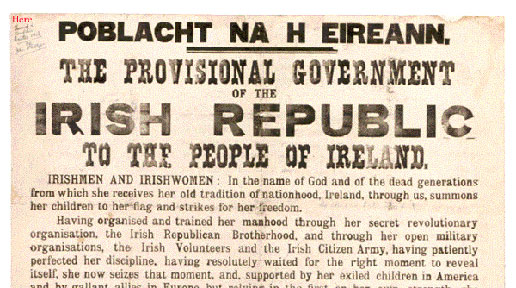
Proclamation of the Irish Republic, April 24, 1916
The British Army reported casualties of 116 dead, 368
wounded and nine missing. Sixteen policemen died and 29 were wounded.
Rebel and civilian casualties were 318 dead and 2,217 wounded. The
Volunteers and Citizen Army recorded 64 killed in action. The majority
of civilian casualties were the result of direct and indirect fire from
British artillery, heavy machine guns and incendiary shells, none of
which the rebels had access to. The British shooting was
indiscriminate. As is the way with all occupying forces, the British
considered anyone not in a British uniform as an enemy and fair game.
Following the Rising, the British arrested a total of 3,430 men and 79
women. Most were subsequently released.
In May, military court martials were held and 93 rebels, including one woman, were sentenced to death by the British Military Court, presided over by Colonel Charles Blackader, commander of the 59th brigade of the 177th regiment which had fought against the rebels. Nearly 2,000 rebels were deported to England where they were imprisoned without trial. Fifteen rebels were executed by firing squad at Dublin's Kilmainham Gaol, including the seven leaders who signed the proclamation of the Irish Republic. One was hanged later. James Connolly, who was wounded in battle, was shot on May 12, 1916, tied to a chair with no blindfold. The British medical officer who attended the executions stated: "They all died like Lions."
The Easter Rising resulted in the workers seizing power
for just six days. It was another important step in the fight to free
Ireland from colonial rule. Lenin wrote in 1916, just prior to the
Rising: "The very fact that revolts do break out at different times, in
different places, and are of different kinds, guarantees wide scope and
depth to the general movement; but it is only in premature, individual,
sporadic and therefore unsuccessful, revolutionary movements that the
masses gain experience, acquire knowledge, gather strength, and get to
know their real leaders, the socialist proletarians, and in this way
prepare for the general onslaught."
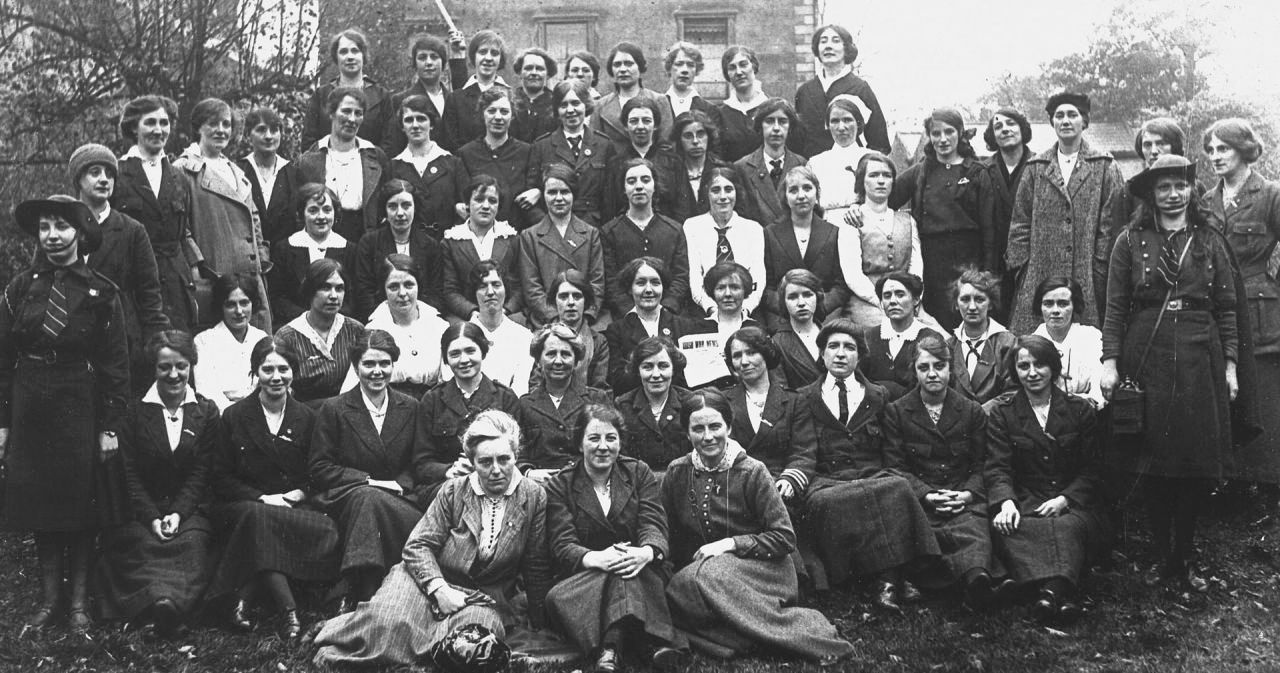
Women played an important role in the Rebellion, with many members of
Cumann
na mBan,
the women’s auxiliary branch of the Irish Volunteers, fighting
for independence. (R. Barracks)
The Irish Declaration of Independence, April 24, 1916
Poblacht na hEireann
The Provisional Government
of the
Irish
Republic
"To the People of Ireland"
Irishmen and Irishwomen:
In the name of God and of the dead generations from which she receives the old tradition of nationhood, Ireland, through us, summons her children to her flag, and strikes for her freedom.
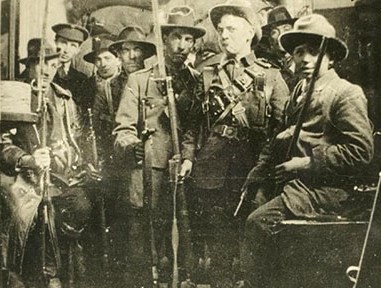 Having organized and
trained her manhood through her
secret
revolutionary organization, the Irish Republican Brotherhood, and
through her open military organizations, the Irish Volunteers and
the Irish Citizen Army, having patiently perfected her
discipline, having resolutely waited for the right moment to
reveal itself, she now seizes that moment, and, supported by her
exiled children in America and by gallant allies in Europe, but
relying in the first on her own strength, she strikes in full
confidence of victory.
Having organized and
trained her manhood through her
secret
revolutionary organization, the Irish Republican Brotherhood, and
through her open military organizations, the Irish Volunteers and
the Irish Citizen Army, having patiently perfected her
discipline, having resolutely waited for the right moment to
reveal itself, she now seizes that moment, and, supported by her
exiled children in America and by gallant allies in Europe, but
relying in the first on her own strength, she strikes in full
confidence of victory.
We declare the right of the people of Ireland to the ownership of Ireland, and to the unfettered control of Irish destinies, to be sovereign and indefeasible. The long usurpation of that right by a foreign people and government has not extinguished the right, nor can it ever be extinguished except by the destruction of the Irish people. In every generation the Irish people have asserted their right to national freedom and sovereignty; six times during the past three hundred years they have asserted it in arms. Standing on that fundamental right and again asserting it in arms in the face of the world, we hereby proclaim the Irish Republic as a Sovereign Independent State. And we pledge our lives and the lives of our comrades-in-arms to the cause of its freedom, of its welfare, and of its exaltation among the nations.
The Irish Republic is entitled to, and hereby claims, the allegiance of every Irishman and Irish woman. The Republic guarantees religious and civil liberty, equal rights and equal opportunities of all its citizens, and declares its resolve to pursue the happiness and prosperity of the whole nation and of all its parts, cherishing all the children of the nation equally, and oblivious of the differences carefully fostered by an alien government, which have divided a minority in the past.
|
|
Until our arms have brought the opportune moment for the establishment of a permanent National Government, representative of the whole people of Ireland and elected by the suffrages of all her men and women, the Provisional Government, hereby constituted, will administer the civil and military affairs of the Republic in trust for the people.
We place the cause of the Irish Republic under the protection of the Most High God, Whose blessing we invoke upon our arms, and we pray that no one who serves that cause will dishonour it by cowardice, inhumanity, or rapine. In this supreme hour the Irish nation must, by its valour and discipline and by the readiness of its children to sacrifice themselves for the common good, prove itself worthy of the august destiny to which it is called.
Signed on behalf of the Provisional Government
Thomas J Clarke,
Sean MacDiarmada, Thomas MacDonagh, PH
Pearse,
Eamon Ceannt, James Connolly, Joseph Plunket
Our Duty in This Crisis
What should be the attitude to the working-class democracy of Ireland in face of the present crisis? I wish to emphasise the fact that the question is addressed to the 'working-class democracy' because I believe that it would be worse than foolish -- it would be a crime against all our hopes and aspirations -- to take counsel in this matter from any other source.
|
|
Mr. John E. Redmond has just earned the plaudits of all the bitterest enemies of Ireland and slanderers of the Irish race by declaring, in the name of Ireland that the British Government can now safely withdraw all its garrisons from Ireland, and that the Irish slaves will guarantee to protect the Irish estate of England until their masters come back to take possession -- a statement that announces to all the world that Ireland has at last accepted as permanent this status of a British province. Surely no inspiration can be sought from that source.
The advanced Nationalists have neither a policy nor a leader. During the Russian Revolution such of their Press as existed in and out of Ireland, as well as their spokesmen, orators and writers vied with each other in laudation of Russia and vilification of all the Russian enemies of Czardom. It was freely asserted that Russia was the natural enemy of England; that the heroic revolutionalists were in the pay of the English Government and that every true Irish patriot ought to pray for the success of the armies of the Czar.
Now, as I, amongst other Irish Socialists, predicted all along, when the exigencies of diplomacy makes it suitable, the Russian bear and the English lion are hunting together and every victory for the Czar's Cossacks is a victory for the paymasters of those King's Own Scottish Borderers who, but the other day, murdered the people of Dublin in cold blood. Surely the childish intellects that conceived of the pro-Russian campaign of nine years ago cannot give us light and leading in any campaign for freedom from the British allies of Russia today? It is well to remember also that in this connection since 1909 the enthusiasm for the Russians was replaced in the same quarter by as blatant a propaganda in favour of the German War Lord. But since the guns did begin to speak in reality this propaganda had died out in whispers, whilst without a protest, the manhood of Ireland was pledged to armed warfare against the very power our advanced Nationalist friends have wasted so much good ink in acclaiming.
Of late, sections of the advanced Nationalist press have lent themselves to a desperate effort to misrepresent the position of the Carsonites, and to claim for them the admiration of Irish Nationalists on the grounds that these Carsonites were fearless Irishmen who had refused to take dictation from England. A more devilishly mischievous and lying doctrine was never preached in Ireland. The Carsonite position is indeed plain -- so plain that nothing but sheer perversity of purpose can misunderstand it, or cloak it with a resemblance to Irish patriotism. The Carsonites say that their fathers were planted in this country to assist in keeping the natives down in subjection that this country might be held for England. That this was God's will because the Catholic Irish were not fit for the responsibilities and powers of free men and that they are not fit for the exercise of these responsibilities and powers till this day. Therefore, say the Carsonites, we have kept our side of the bargain; we have refused to admit the Catholics to power and responsibility; we have manned the government of this country for England, we propose to continue to do so, and rather than admit that these Catholics -- these 'mickies and teagues' -- are our equals, we will fight, in the hope that our fighting will cause the English people to revolt against their government and re-establish us in our historic position as an English colony in Ireland, superior to, and unhampered by, the political institutions of the Irish natives.
How this can be represented as the case of Irishmen refusing to take dictation from England passeth all comprehension. It is rather the case of a community in Poland, after 250 years colonisation, still refusing to adopt the title of natives, and obstinately clinging to the position and privileges of a dominant colony. Their programme is summed up in the expression which forms the dominant note of all their speeches, sermons and literature:
"We are loyal British subjects. We hold this country for England. England cannot desert us."
What light or leading then can Ireland get from the hysterical patriots who so egregiously misrepresent this fierce contempt for Ireland as something that ought to win the esteem of Irishmen?
What ought to be the attitude of the working-class democracy of Ireland in face of the present crisis?
In the first place, then, we ought to clear our minds of all the political cant which would tell us that we have either 'natural enemies' or 'natural allies' in any of the powers now warring. When it is said that we ought to unite to protect our shores against the 'foreign enemy' I confess to be unable to follow that line of reasoning, as I know of no foreign enemy of this country except the British Government and know that it is not the British Government that is meant.
In the second place we ought to seriously consider that the evil effects of this war upon Ireland will be simply incalculable, that it will cause untold suffering and misery amongst the people, and that as this misery and suffering have been brought upon us because of our enforced partisanship with a nation whose government never consulted us in the matter, we are therefore perfectly at liberty morally to make any bargain we may see fit, or that may present itself in the course of events.
 Should a German army land in
Ireland tomorrow we should
be
perfectly justified in joining it if by doing so we could rid
this country once and for all from its connection with the
Brigand Empire that drags us unwillingly into this war.
Should a German army land in
Ireland tomorrow we should
be
perfectly justified in joining it if by doing so we could rid
this country once and for all from its connection with the
Brigand Empire that drags us unwillingly into this war.
Should the working class of Europe, rather than slaughter each other for the benefit of kings and financiers, proceed tomorrow to erect barricades all over Europe, to break up bridges and destroy the transport service that war might be abolished, we should be perfectly justified in following such a glorious example and contributing our aid to the final dethronement of the vulture classes that rule and rob the world.
But pending either of these consummations it is our manifest duty to take all possible action to save the poor from the horrors this war has in store.
Let it be remembered that there is no natural scarcity of food in Ireland. Ireland is an agricultural country, and can normally feed all her people under any sane system of things. But prices are going up in England and hence there will be an immense demand for Irish produce. To meet that demand all nerves will be strained on this side, the food that ought to feed the people of Ireland will be sent out of Ireland in greater quantities than ever and famine prices will come in Ireland to be immediately followed by famine itself. Ireland will starve, or rather the townspeople of Ireland will starve, that the British army and navy and jingoes may be fed. Remember, the Irish farmer like all other farmers will benefit by the high prices of the war, but these high prices will mean starvation to the labourers in the towns. But without these labourers the farmers' produce cannot leave Ireland without the help of a garrison that England cannot now spare. We must consider at once whether it will not be our duty to refuse to allow agricultural produce to leave Ireland until provision is made for the Irish working class.
Let us not shrink from the consequences. This may mean more than a transport strike, it may mean armed battling in the streets to keep in this country the food for our people. But whatever it may mean it must not be shrunk from. It is the immediately feasible policy of the working-class democracy, the answer to all the weaklings who in this crisis of our country's history stand helpless and bewildered crying for guidance, when they are not hastening to betray her.
Starting thus, Ireland may yet set the torch to a European conflagration that will not burn out until the last throne and the last capitalist bond and debenture will be shrivelled on the funeral pyre of the last war lord.
We Only Want the Earth

For our demands most modest are,
We only want the earth.
"Be moderate," the trimmers cry,
Who dread the tyrants' thunder.
"You ask too much and people fly
From you aghast in wonder."
'Tis passing strange, for I declare
Such statements give me mirth,
For our demands most moderate are,
We only want the earth.
Our masters all a godly crew,
Whose hearts throb for the poor,
Their sympathies assure us, too,
If our demands were fewer.
Most generous souls! But please observe,
What they enjoy from birth
Is all we ever had the nerve
To ask, that is, the earth.
The "labour fakir" full of guile,
Base doctrine ever preaches,
And whilst he bleeds the rank and file
Tame moderation teaches.
Yet, in despite, we'll see the day
When, with sword in its girth,
Labour shall march in war array
To realize its own, the earth.
For labour long, with sighs and tears,
To its oppressors knelt.
But never yet, to aught save fears,
Did the heart of tyrant melt.
We need not kneel, our cause no dearth
Of loyal soldiers' needs
And our victorious rallying cry
Shall be we want the earth!
The Irish Rebellion of 1916 --
The Discussion on
Self-Determination Summed Up

Painting "Birth of the Irish Republic"
The
following is an excerpt from the article by V. I. Lenin, "The
Discussion on Self-Determination Summed Up," first published in October
1916. Lenin wrote to clarify the issue of self-determination of nations
including the significance of the Irish Rebellion in opposition to the
opportunist and chauvinist theses put forward by Polish
social-democrats and the so-called Zimmerwald Leftists. These theses
dismissed the revolt of oppressed nations such as Ireland and the
important role of their struggle for their right to self-determination
in the proletarian revolution. In his conclusion, Lenin pointed out,
"The epoch of imperialism has turned all the ‘great' powers into the
oppressors of a number of nations, and the development of imperialism
will inevitably lead to a more definite division of trends in this
question in international Social-Democracy as well."
***
Our theses were written before the outbreak of this rebellion, which must be the touchstone of our theoretical views.
The views of the opponents of self-determination lead to the conclusion that the vitality of small nations oppressed by imperialism has already been sapped, that they cannot play any role against imperialism, that support of their purely national aspirations will lead to nothing, etc. The imperialist war of 1914-16 has provided facts which refute such conclusions.
The war proved to be an epoch of crisis for the West-European nations, and for imperialism as a whole. Every crisis discards the conventionalities, tears away the outer wrappings, sweeps away the obsolete and reveals the underlying springs and forces. What has it revealed from the standpoint of the movement of oppressed nations? In the colonies there have been a number of attempts at rebellion, which the oppressor nations, naturally did all they could to hide by means of a military censorship. Nevertheless, it is known that in Singapore the British brutally suppressed a mutiny among their Indian troops; that there were attempts at rebellion in French Annam (see Nashe Slovo) and in the German Cameroons (see the Junius pamphlet); that in Europe, on the one hand, there was a rebellion in Ireland, which the "freedom-loving" English, who did not dare to extend conscription to Ireland, suppressed by executions, and, on the other, the Austrian Government passed the death sentence on the deputies of the Czech Diet "for treason," and shot whole Czech regiments for the same "crime."
This list is, of course, far from complete. Nevertheless, it proves that, owing to the crisis of imperialism, the flames of national revolt have flared up both in the colonies and in Europe, and that national sympathies and antipathies have manifested themselves in spite of the Draconian threats and measures of repression. All this before the crisis of imperialism hit its peak; the power of the imperialist bourgeoisie was yet to be undermined (this may be brought about by a war of "attrition" but has not yet happened) and the proletarian movements in the imperialist countries were still very feeble. What will happen when the war has caused complete exhaustion, or when, in one state at least, the power of the bourgeoisie has been shaken under the blows of proletarian struggle, as that of tsarism in 1905?
On May 9, 1916, there appeared in Berner Tagwacht, the organ of the Zimmerwald group, including some of the Leftists, an article on the Irish rebellion entitled "Their Song Is Over" and signed with the initials K.R. It described the Irish rebellion as being nothing more nor less than a "putsch," for, as the author argued, "the Irish question was an agrarian one," the peasants had been pacified by reforms, and the nationalist movement remained only a "purely urban, petty-bourgeois movement, which, notwithstanding the sensation it caused, had not much social backing."
It is not surprising that this monstrously doctrinaire and pedantic assessment coincided with that of a Russian national-liberal Cadet, Mr. A. Kulisher (Rech, No. 102, April 15, 1916)[1], who also labelled the rebellion "the Dublin putsch."
It is to be hoped that, in accordance with the adage, "it's an ill wind that blows nobody any good," many comrades, who were not aware of the morass they were sinking into by repudiating "self-determination" and by treating the national movements of small nations with disdain, will have their eyes opened by the "accidental" coincidence of opinion held by a Social-Democrat and a representative of the imperialist bourgeoisie!!
The term "putsch," in its scientific sense, may be employed only when the attempt at insurrection has revealed nothing but a circle of conspirators or stupid maniacs, and has aroused no sympathy among the masses. The centuries-old Irish national movement, having passed through various stages and combinations of class interest, manifested itself, in particular, in a mass Irish National Congress in America (Vorwarts, March 20, 1916) which called for Irish independence; it also manifested itself in street fighting conducted by a section of the urban petty bourgeoisie and a section of the workers after a long period of mass agitation, demonstrations, suppression of newspapers, etc. Whoever calls such a rebellion a "putsch" is either a hardened reactionary, or a doctrinaire hopelessly incapable of envisaging a social revolution as a living phenomenon.
|
|
To imagine that social revolution is conceivable without revolts by small nations in the colonies and in Europe, without revolutionary outbursts by a section of the petty bourgeoisie with all its prejudices, without a movement of the politically non-conscious proletarian and semi-proletarian masses against oppression by the landowners, the church, and the monarchy, against national oppression, etc. -- to imagine all this is to repudiate social revolution. So one army lines up in one place and says, "We are for socialism," and another, somewhere else and says, "We are for imperialism," and that will be a social revolution! Only those who hold such a ridiculously pedantic view could vilify the Irish rebellion by calling it a "putsch."
Whoever expects a "pure" social revolution will never live to see it. Such a person pays lip-service to revolution without understanding what revolution is.
The Russian Revolution of 1905 was a bourgeois-democratic revolution. It consisted of a series of battles in which all the discontented classes, groups and elements of the population participated. Among these there were masses imbued with the crudest prejudices, with the vaguest and most fantastic aims of struggle; there were small groups which accepted Japanese money, there were speculators and adventurers, etc. But objectively, the mass movement was breaking the back of tsarism and paving the way for democracy; for this reason the class-conscious workers led it.
The socialist revolution in Europe cannot be anything other than an outburst of mass struggle on the part of all and sundry oppressed and discontented elements. Inevitably, sections of the petty bourgeoisie and of the backward workers will participate in it -- without such participation, mass struggle is impossible, without it no revolution is possible -- and just as inevitably will they bring into the movement their prejudices, their reactionary fantasies, their weaknesses and errors. But objectively they will attack capital, and the class-conscious vanguard of the revolution, the advanced proletariat, expressing this objective truth of a variegated and discordant, motley and outwardly fragmented, mass struggle, will be able to unite and direct it, capture power, seize the banks, expropriate the trusts which all hate (though for different reasons!), and introduce other dictatorial measures which in their totality will amount to the overthrow of the bourgeoisie and the victory of socialism, which, however, will by no means immediately "purge" itself of petty-bourgeois slag.
Social-Democracy, we read in the Polish theses (I, 4), "must utilise the struggle of the young colonial bourgeoisie against European imperialism in order to sharpen the revolutionary crisis in Europe." (Authors' italics.)
Is it not clear that it is least of all permissible to contrast Europe to the colonies in this respect? The struggle of the oppressed nations in Europe, a struggle capable of going all the way to insurrection and street fighting, capable of breaking down the iron discipline of the army and martial law, will "sharpen the revolutionary crisis in Europe" to an infinitely greater degree than a much more developed rebellion in a remote colony. A blow delivered against the power of the English imperialist bourgeoisie by a rebellion in Ireland is a hundred times more significant politically than a blow of equal force delivered in Asia or in Africa.
The French chauvinist press recently reported the publication in Belgium of the eightieth issue of an illegal journal, Free Belgium[2]. Of course, the chauvinist press of France very often lies, but this piece of news seems to be true. Whereas chauvinist and Kautskyite German Social-Democracy has failed to establish a free press for itself during the two years of war, and has meekly borne the yoke of military censorship (only the Left Radical elements, to their credit be it said, have published pamphlets and manifestos, in spite of the censorship) -- an oppressed civilised nation has reacted to a military oppression unparalleled in ferocity by establishing an organ of revolutionary protest! The dialectics of history are such that small nations, powerless as an independent factor in the struggle against imperialism, play a part as one of the ferments, one of the bacilli, which help the real anti-imperialist force, the socialist proletariat, to make its appearance on the scene.
The general staffs in the current war are doing their utmost to utilise any national and revolutionary movement in the enemy camp: the Germans utilise the Irish rebellion, the French -- the Czech movement, etc. They are acting quite correctly from their own point of view. A serious war would not be treated seriously if advantage were not taken of the enemy's slightest weakness and if every opportunity that presented itself were not seized upon, the more so since it is impossible to know beforehand at what moment, where, and with what force some powder magazine will "explode." We would be very poor revolutionaries if, in the proletariat's great war of liberation for socialism, we did not know how to utilise every popular movement against every single disaster imperialism brings in order to intensify and extend the crisis. If we were, on the one hand, to repeat in a thousand keys the declaration that we are "opposed" to all national oppression and, on the other, to describe the heroic revolt of the most mobile and enlightened section of certain classes in an oppressed nation against its oppressors as a "putsch," we should be sinking to the same level of stupidity as the Kautskyites.
It is the misfortune of the Irish that they rose prematurely, before the European revolt of the proletariat had had time to mature. Capitalism is not so harmoniously built that the various sources of rebellion can immediately merge of their own accord, without reverses and defeats. On the other hand, the very fact that revolts do break out at different times, in different places, and are of different kinds, guarantees wide scope and depth to the general movement; but it is only in premature, individual, sporadic and therefore unsuccessful, revolutionary movements that the masses gain experience, acquire knowledge, gather strength, and get to know their real leaders, the socialist proletarians, and in this way prepare for the general onslaught, just as certain strikes, demonstrations, local and national, mutinies in the army, outbreaks among the peasantry, etc., prepared the way for the general onslaught in 1905.
Notes
1. Rech (Speech): A daily, the Central Organ of the Cadet Party published in Petersburg from February 1906; closed down by the Petrograd Soviet's Revolutionary Military Committee on October 26 (November 8) 1917; publication continued under another title until August 1918.
2. Libre Belgium (Free Belgium) -- an illegal journal of the Belgian Labour Party, Brussels (1915-18)
(Volume 22, Collected Works)
Website: www.cpcml.ca Email: editor@cpcml.ca

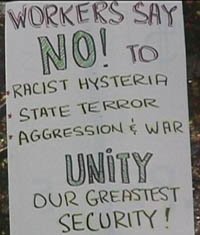 All objections to
empire-building are brushed aside as
damaging to the economy and the provision of jobs. Selling
military weapons to odious medieval regimes such as Saudi Arabia
is hailed as providing jobs in Canada because no alternative
exists within the imperialist free trade system of
empire-building.
All objections to
empire-building are brushed aside as
damaging to the economy and the provision of jobs. Selling
military weapons to odious medieval regimes such as Saudi Arabia
is hailed as providing jobs in Canada because no alternative
exists within the imperialist free trade system of
empire-building.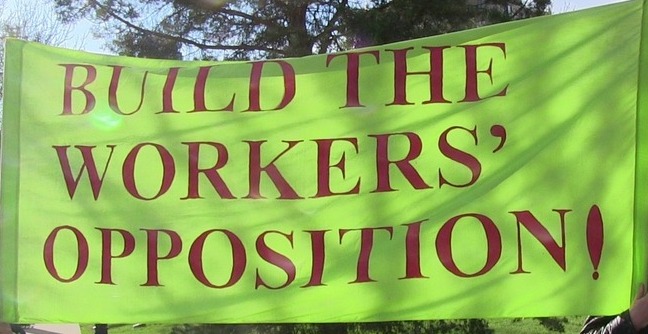 In contrast, the working
class confronts the ruling ideology
with its own ideological considerations, giving rise to modern
definitions on the basis of which modern nation-building can take
place. The anachronistic institutions and arrangements can be
replaced with modern ones which are consistent with the
requirements of the times. The working class out of necessity
must be materialist and dialectical in its outlook and base its
ideology on the objectivity of consideration. The historical
social conditions charge the workers with the task to complete the
transition
of society from petty production to industrial mass production.
To do so requires modern economic, political and social
conditions and institutions and relations in harmony with the
socialized forces of modern production. The thinking and ideology
of the working class must be modern in keeping with the economic
conditions of production, and how it acquires its living and
reproduces life, the forces of production and society.
In contrast, the working
class confronts the ruling ideology
with its own ideological considerations, giving rise to modern
definitions on the basis of which modern nation-building can take
place. The anachronistic institutions and arrangements can be
replaced with modern ones which are consistent with the
requirements of the times. The working class out of necessity
must be materialist and dialectical in its outlook and base its
ideology on the objectivity of consideration. The historical
social conditions charge the workers with the task to complete the
transition
of society from petty production to industrial mass production.
To do so requires modern economic, political and social
conditions and institutions and relations in harmony with the
socialized forces of modern production. The thinking and ideology
of the working class must be modern in keeping with the economic
conditions of production, and how it acquires its living and
reproduces life, the forces of production and society.
 The essence of the Report
of the Expert Panel and others is
to give ideological support to state-organized pay-the-rich
programs and empire-building, block investments in social
programs and to outline policy objectives that more efficiently
deliver public money to private corporate interests without
controversy or opposition.
The essence of the Report
of the Expert Panel and others is
to give ideological support to state-organized pay-the-rich
programs and empire-building, block investments in social
programs and to outline policy objectives that more efficiently
deliver public money to private corporate interests without
controversy or opposition.



